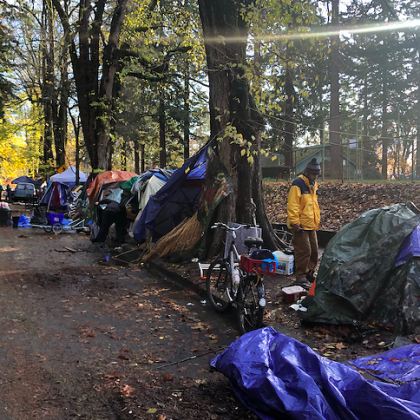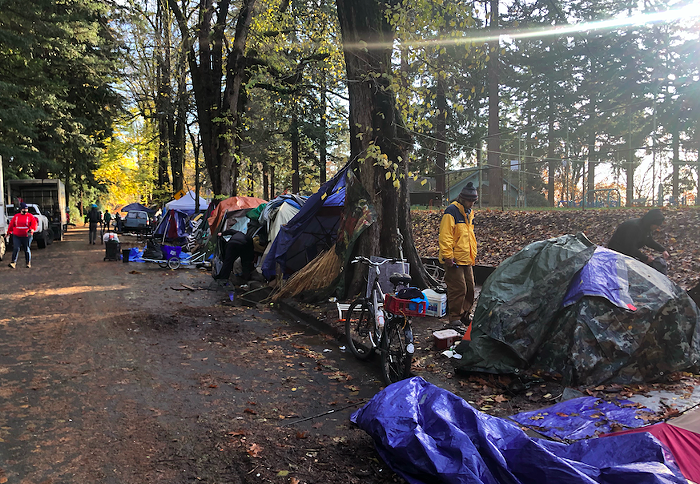Feature your business, services, products, events & news. Submit Website.
Breaking Top Featured Content:
Portland and Multnomah County Pledge Nearly $40 Million in Surplus Budget Dollars Toward Homeless Services


The city of Portland and Multnomah County are pooling their excess budget dollars to address the region’s homelessness crisis. On Monday, the jurisdictions unveiled a $38 million funding package to create more shelter beds, fund homeless outreach workers, and increase behavioral health services for people living outside.
“The houseless crisis has been chipping away at the city’s soul for nearly a decade,” said City Commissioner Dan Ryan at an afternoon press conference announcing this investment. “I’m pleased today that I have more hope than ever than in my first 13 months in office about the alignment of resources [and] the willingness to streamline services.”
The city has committed $18.9 million to the budget package, while the county has pledged $19.2 million.
This decision comes as both Portland and Multnomah County report unusually large amounts of surplus revenue in their general funds, collected from business licenses taxes on companies that did well during the pandemic. Portland has an estimated $62 million in surplus dollars while the county has a little over $30 million in excess funds.
The funding bundle will create up to 400 new shelter beds in different facilities across the county, grow the county’s team of homeless outreach workers by at least 20 staff, expand the number of portable toilets and hand-washing stations across the region, and expand staffing for community-based programs that clean up trash across the county. Many of the outreach programs will focus on Old Town Chinatown, an area of downtown Portland that has seen an increase in homeless camping since the pandemic began.
According to Multnomah County Chair Deborah Kafoury, this investment will create the largest number of shelter beds the county has ever had available at one time—around 2,000 total. On Monday, Kafoury said that this joint investment has strengthened the relationship between the county and city, which have often been placed at odds with each other over their approach to homelessness.
“This joint package demonstrates our shared sense of urgency and our mutual desire to expand and reinforce systems to meet immediate needs in compassionate and effective ways,” said Kafoury.
Portland Mayor Ted Wheeler said the joint programming will allow the city to increase homeless camp cleanups, or sweeps, “fivefold.”
“Most of the trash and debris that needs to be cleaned up in the city is related to unsanctioned homeless camps,” said Wheeler. “Current camp removal efforts aren’t keeping up in a timely manner.”
Wheeler said this wouldn’t change the new protocol around what determines which camps are swept by the city, it would simply expand the team responsible for those cleanups, the Homeless and Urban Camping Impact Reduction Program (HUCIRP), by six employees.
Here’s the total funding breakdown:
$1,375,000 for outreach programs at “high-need unsanctioned encampments”
$405,000 to increase county programs to eradicate rodents from encampments
$6,500,000 to expand of the city’s Homeless and Urban Camping Impact Reduction Program (HUCIRP)
$500,000 to pay contractors to pickup trash left in “locations with dangerous terrain,” like the side of a freeway
$4,850,000 to expand storage and portable hygiene services for 250 to 300 unsanctioned camps
$350,000 to create a “Street Services Coordination Center,” a new program to better coordinate the many different homeless services across the county
$2,000,000 to hire and create retention incentives for new staff
$2,500,000 to enhance mental and behavioral health support programs
$650,000 to expand the Portland Police Bureau’s (PPB) Behavioral Health Unit
$1,000,000 to reimburse shelter providers for shelter fees
$18,000,000 to increase number of shelter beds citywide
Wheeler also urged Congress to consider making an investment in homeless prevention programs as it places finishing touches on President Joe Biden’s “Build Back Better” bill.
“I call on you to embrace houselessness as the national humanitarian crisis that it is,” said Wheeler Monday, directing his comments to Congress. “American cities cannot solve homelessness without your help. This crisis will not ebb until there is a federally funded plan to prevent it.”
This influx in funding comes as Multnomah County is distributing its first $52 million in annual funding from the regional Supporting Housing Services measure, funds reserved for programs that help previously unhoused people get the support they need to find and retain permanent housing.
Portland City Council will determine how to spend the rest of its surplus funds during its annual fall budget adjustment process, where commissioners revisit the annual budget approved in June and retool areas where they may have overestimated or underestimated costs. Council will hold its first work session to discuss these funds Thursday afternoon.
Per city policy, Portland City Council can only spend half of the surplus dollars on general service programs. The remaining half is reserved for maintenance and infrastructure (or, “capitol”) projects. That leaves council with around $31 million to spend on programs it may have underfunded in June or brand new programs. After making this investment in homeless services, the council will have about $13 million to distribute to other programs.
Wheeler has already announced plans to suggest using $400,000 to hire back 25 recently retired police officers and more funds to build out a body-worn camera program within PPB. City Comissioner Jo Ann Hardesty will propose using about $1.8 million in already reserved funding to expand the Portland Street Response citywide, and City Commissioner Mingus Mapps plans on suggesting budget dollars go toward strengthening the city’s 911 system. Mapps has also publicly advocated for more funding to support the PPB’s Behavioral Health Unit, which will receive funding though the joint county-city investment.
Portland City Council will vote on the fall budget adjustments by the end of November.
Continue Reading at PortlandMercury.com here
